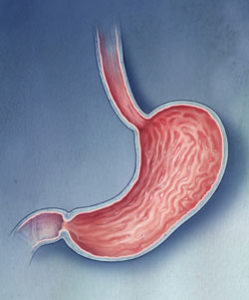 La gastritis es una inflamación de la mucosa del estómago. Se considera aguda cuando la inflamación se produce de forma repentina y crónica cuando la inflamación se produce a lo largo de un periodo de tiempo.
La gastritis es una inflamación de la mucosa del estómago. Se considera aguda cuando la inflamación se produce de forma repentina y crónica cuando la inflamación se produce a lo largo de un periodo de tiempo.
Preguntas frecuentes
Las causas más comunes son los medicamentos como la aspirina o los antiinflamatorios conocidos como AINE (antiinflamatorios no esteroideos que incluyen la aspirina y los productos a base de ibuprofeno), el alcohol, el tabaco, las infecciones estomacales como la bacteria Heliobacter pylori o la pérdida de la capa protectora del revestimiento del estómago. Otras causas menos frecuentes son comer o beber sustancias cáusticas o corrosivas, reflujo biliar, trastornos autoinmunes (como lupus y artritis reumatoide), exceso de ácido estomacal o infección vírica.
Además de estas causas, la gastritis aguda puede estar provocada por un estrés fisiológico extremo y asociarse a enfermedades o traumatismos graves y agudos, como un consumo excesivo de alcohol reciente, una intervención quirúrgica importante, un traumatismo craneoencefálico o una insuficiencia renal, hepática o respiratoria.
Los síntomas incluyen dolor abdominal o indigestión, pérdida de apetito, náuseas, vómitos, vómitos de sangre o de material parecido al café molido, o deposiciones que producen heces oscuras. La gastritis aguda también puede ir acompañada de hipo.
Las pruebas varían en función de la causa concreta. Su médico puede aconsejarle una radiografía del tubo digestivo superior, una endoscopia (se introduce un endoscopio fino y flexible en el estómago a través de la boca), una biopsia o análisis de sangre.
Dependiendo de la causa, algunos casos de gastritis se resuelven con el tiempo sin tratamiento. En otros, se necesitan antiácidos u otros medicamentos para disminuir o neutralizar el ácido estomacal, eliminar los síntomas y favorecer la curación. Si tiene una úlcera gástrica necesitará tratamiento especializado.
Eliminar o reducir el alcohol y los AINE reducirá el riesgo. La gastritis causada por el estrés puede prevenirse eliminando o reduciendo el estrés o mediante medicación, como un inhibidor de la bomba de protones, para disminuir la producción de ácido gástrico.
Los pacientes con gastritis pueden correr el riesgo de desarrollar úlceras de estómago. En los casos en que la gastritis está causada por la bacteria helicobacter pylori, puede haber un mayor riesgo de cáncer de estómago o linfoma (neoplasia maligna del sistema linfático).